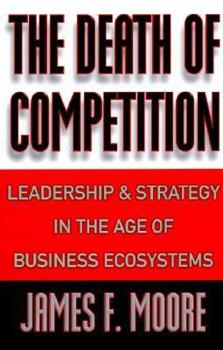The Death of Competition: Leadership and Strategy in the Age of Business Ecosystems
Select Format
Select Condition 
Book Overview
Today's marketplace is seeing radical changes in the way companies do business with one another. New partnerships and alliances are constantly being forged, the lines between industries have blurred,... This description may be from another edition of this product.
Format:Hardcover
Language:English
ISBN:0887308090
ISBN13:9780887308093
Release Date:January 1996
Publisher:HarperCollins Publishers
Length:297 Pages
Weight:1.35 lbs.
Dimensions:1.1" x 6.4" x 9.5"
Customer Reviews
5 ratings
A new way of thinking about business. - An important book
Published by Thriftbooks.com User , 21 years ago
In The Death of Competition, James Moore asks us to reconsider the way we think about business at the most basic level. In this thought provoking analysis, Moore takes us from the Hawaiian Islands to the jungles of Costa Rica, and from war torn Mogadishu to the boardrooms of Wal-Mart and Intel. Clearly this is a book that goes far beyond the standard boundaries of a "business" book.Moore tells us that we need to consider our business as being part of an "ecosystem". Whereas the value chain would encompass suppliers and distributors, the ecosystem is much broader. Members of the ecosystem may sell complimentary products, after sales services, or other products and services that are vital to the overall customer experience. Even when considering the members of the value chain, Moore tells us to think in terms of the ecosystem, and look for ways of making the connections deeper, stronger, and more to our advantage. Among other examples, Moore shows us how Wal-Mart, by forging relationships with suppliers that are much closer than the classic manufacturer-retailer relationship, has positioned itself at the center of an ecosystem that is stable and strong. In another section, he compares the way that Intel fostered an ecosystem around the Pentium line of microprocessors, and how the diversity and strength of this ecosystem kept other "ecosystems" such as Apple and Next, from encroaching. He also showed how Apple made it more difficult for other members of its ecosystem to co-evolve, making the entire Apple centered ecosystem weaker.The central theme of the book is that business ecosystems, like biological ecosystems, evolve. Each of these evolutionary stages brings both opportunities and threats, and the businesses within ecosystems need to understand both the status of the ecosystem they are in, and their role in it, or they risk extinction. First, Moore compares ecosystems in Hawaii and Costa Rica, showing how an isolated and protected ecosystem, such as Hawaii, can give rise to a rich and diverse ecosystem, but one that is fragile and easily overwhelmed by invading species. By comparison, the ecosystem of the Costa Rican jungle, on the bridge between North and South America, gives rise to species that have had to protect their niches from invaders on a regular basis, the result is a hardier, more robust ecosystem.Having established the metaphor, Moore takes us through the four stages of ecosystem evolution: pioneering, growth, maturation, and renewal or death. First, he traces the history of the automotive industry ecosystems through all four stages, then he presents an in depth case study for each stage. The case studies are rich, diverse, and fascinating, ranging from the creation of a telephone system in Mogadishu to the prospects for health care in the U.S. Throughout the case studies Moore shows how decisions are made, and the effects of those decisions. In some of the most interesting analyses of the book, Moore examines the 7 "
This book is really about leadership and vision.
Published by Thriftbooks.com User , 24 years ago
Today's buisness environment needs leadership. There are many well studied reports about the changing face of competition -- but few are able to integrate them with the leaders that Mr. Moore uses in his examples. The author has done a great job of presenting the "state-of-the-union" of the competition-cooperation landscape with his biology metaphore. He has done an outstanding job of illustrating the quality and nature of the leaders who led their companies through the various stages he describes. This book is worth reading and re-reading for leaders and leader wannabees.
Leadership is as important as strategy
Published by Thriftbooks.com User , 24 years ago
This book illustrates that leadership, like good ideas are lasting. I am encouraged that the ideas about leadership that Jim Moore is presenting have the staying power to make it into the hands of our leaders. As a college professor, I was very impressed when Vice President Al Gore recently referred to this book as an example of business leadership and the American pioneering spirit. The comparisson to the pioneering aspect of the Internet and todays business transition is very appropriate. After listening to Al Gore and reading the book, I think that he actually read it. Normally politicians will only refer to something on the best seller list and employ superficial quotes from the most recent Sunday paper promos.After reading this book, I found it to be thoughtfull, clear and more appropriate today than when it was originally published.This book is worth the read for non-business and business leaders alike. I hope other leaders read this book as well.
The book the convergence business is actually reading
Published by Thriftbooks.com User , 26 years ago
The ecosystem approach to analyzing industries described by Moore is powerful. My friends managing high tech companies have used Moore's concepts and approachs to great success, particularly in changing and converging environments. Companies must learn to co-evolve and cooperate. This book tells you how.
Insightful analogy drawn between ecosystems and businesses
Published by Thriftbooks.com User , 28 years ago
Drawing an analogy between the ecosystem and the business environment, the author provides an insight into how businesses should cope with the ever evolving and changing business environments. The text cites examples of how successful companies define or help shape their "ecosystems" and subsequently gain competitive advantage





